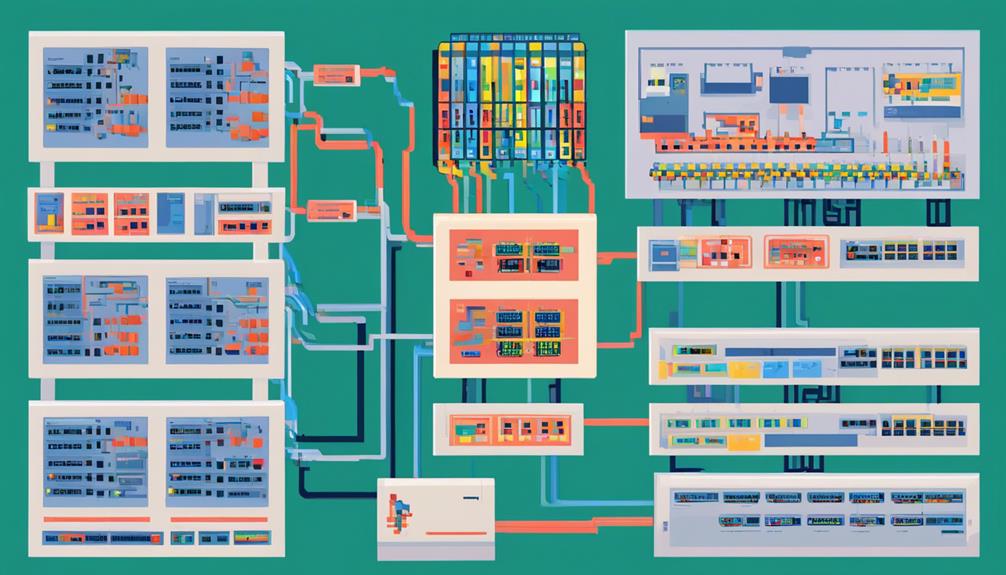In the world of telecommunications, the PBX system holds a crucial role, yet its inner workings might remain somewhat elusive to many.
A PBX system, or Private Branch Exchange, serves as an internal telephone network within an organization, enabling seamless communication between users. It is responsible for managing a range of essential phone features, including inbound and outbound calls, call forwarding, voicemail, and more.
However, the true complexity of PBX systems lies in their ability to connect an organization's private telephone network to the outside world.
To fully grasp the intricacies of this technology and its multitude of benefits, it is vital to understand the basics of PBX systems, how they operate, the different types available, and how to choose the most suitable option.
So, let us embark on a journey into the realm of PBX systems, where we will unravel the mysteries and discover the power behind this indispensable tool.
Key Takeaways
- PBX systems are internal telephone networks that facilitate seamless communication within organizations.
- PBX systems can be traditional hardware-based or IP-based using VoIP technology.
- There are different types of PBX systems, including cloud PBX, VoIP PBX, analog PBX, and hybrid PBX.
- PBX systems offer benefits such as seamless call transfer, customized greetings, call center management, multi-location connectivity, cost savings, scalability, and access to advanced features.
Basics of PBX Systems

A PBX (Private Branch Exchange) is an internal telephone network that enables users to communicate with each other and manage inbound and outbound calls within a company's private network. It forms the backbone of a business phone system, providing essential call management features. PBX systems can be either traditional legacy systems or modern IP-based systems.
Traditional PBX systems, also known as legacy PBX systems, typically consist of physical hardware components such as phone lines, switches, and routers. These systems require dedicated space within the office premises and the assistance of systems administrators for setup and maintenance. They provide essential features like call routing, call forwarding, and voicemail, enabling efficient call management within the organization.
In recent years, IP-based PBX systems have gained popularity due to their flexibility and cost-effectiveness. These systems utilize Voice over IP (VoIP) technology, allowing voice calls to be transmitted over the internet instead of traditional phone lines. This eliminates the need for physical hardware and enables businesses to utilize multi-line phone systems without the limitations of physical infrastructure. IP-based PBX systems also offer advanced features like call analytics, CRM integration, and unified communications, enhancing the overall efficiency of business communication.
PBX systems can be deployed in different ways to suit the specific needs of a business. They can be set up on-premises, hosted in the cloud, or implemented as a hybrid system combining both on-premises and cloud-based components. Cloud-hosted PBX systems, also known as virtual PBX systems, offer the advantage of scalability and easier management, as the service provider takes care of hardware and software updates.
How PBX Systems Work
PBX systems function as the central hub of a company's internal telephone network, facilitating communication between internal users and managing inbound and outbound calls within the organization. These business phone systems come in different types, including traditional PBX, analog PBX phone systems, and IP PBX.
Here's how PBX systems work:
- Call routing: PBX systems use a combination of hardware and software to route phone calls. When a user dials a number, the system determines whether the call is internal or external and directs it accordingly.
- Internal communication: PBX systems allow internal users to communicate with each other through extensions. These extensions are assigned to individual users or departments, enabling seamless communication within the organization.
- Call management: PBX systems offer a range of call management features, such as call forwarding, call transfer, and voicemail. Users can easily transfer calls to another extension or send them to voicemail when necessary.
- Interface with external networks: PBX systems connect to external networks, such as the public switched telephone network (PSTN) or VoIP networks, to handle outbound calls. For VoIP-based PBX systems, a high-speed internet connection is required.
- Scalability: PBX systems can accommodate multiple lines and extensions, allowing businesses to scale their communication infrastructure as needed. Additional lines can be added to handle increased call volume or to support more users.
- Maintenance and administration: PBX systems require regular maintenance and administration. Systems administrators are responsible for setting up and configuring the PBX system, as well as managing user accounts, extensions, and system updates.
Types of PBX Systems

There are several different types of PBX systems available for businesses to choose from.
One type is the cloud PBX system, also known as a hosted PBX system. With this type of system, businesses can adjust PBX features such as call transfer, call recording, voicemail transcription, call routing, auto attendants, interactive voice response (IVR), hold music, call forwarding, and more from an online portal. Cloud PBX systems are the preferred choice for startups, small businesses, and enterprises due to their scalability and advanced features.
Another type of PBX system is the VoIP PBX, which stands for Voice over Internet Protocol PBX. This system uses internet protocol to transmit voice calls instead of traditional phone lines. VoIP PBX systems offer advanced calling features and unified communications capabilities, making them ideal for modern business telephony. They also provide cost savings and flexibility for businesses.
On the other hand, there are analog PBX systems, which are the traditional on-premises PBX solutions. These systems require an on-site server and manual wiring to each business phone. While they may have limited and cost-prohibitive features, they are still used by some organizations.
For businesses looking to transition from a legacy system to VoIP technology, a hybrid PBX system may be the right choice. This type of system adapts an on-premises PBX system for use with VoIP telephony. It utilizes SIP trunking technology to provide voice service for the PBX system. While a hybrid PBX system requires upfront setup, server space, and ongoing IT maintenance costs, it can be a good option for organizations with an existing on-premises PBX system.
Benefits of PBX Systems
One significant advantage of PBX systems is their ability to enhance call management and improve overall communication efficiency. PBX systems offer a range of benefits that contribute to a streamlined and effective telephone network. Some of these benefits include:
- Seamless call transfer: PBX systems allow for the smooth transfer of calls between users and departments without dropping connections. This enables employees to collaborate more efficiently and ensures that important calls are not interrupted or lost.
- Customized greetings and messages: PBX systems provide the option to set up personalized greetings with recorded messages and choice of music. This feature enhances the customer experience by creating a professional and welcoming atmosphere when clients call.
- Call center capabilities: PBX systems can operate call centers to effectively manage sales teams or customer support departments. With features such as call queuing, call routing, and interactive voice response (IVR), PBX systems improve customer service and ensure that calls are handled efficiently.
- Multi-location connectivity: PBX systems facilitate the connection of multiple office locations using the same phone system. This promotes unified communication across the organization and allows employees to communicate seamlessly, regardless of their physical location.
In addition to these benefits, PBX systems can also leverage internet-based technologies such as VoIP (Voice over Internet Protocol) and Session Initiation Protocol (SIP). This opens up possibilities for cost savings, scalability, and access to advanced features. Some PBX systems are even hosted in the cloud, providing businesses with flexibility and the ability to access their phone system from anywhere.
Choosing the Right PBX System

When selecting a PBX system for your business, it is crucial to carefully consider factors such as the size and growth projections of your company, as well as its technology needs. PBX systems, also known as Private Branch Exchange systems, are used to manage incoming and outgoing calls within an organization. They have evolved from traditional analog systems, such as Plain Old Telephone Service (PSTN), to modern internet protocol (IP) based systems, such as Voice over IP (VoIP).
For small businesses, a hosted or virtual PBX system might be a cost-effective solution. These systems are hosted in the cloud and do not require any on-premises hardware. They offer scalability, allowing you to easily add and remove lines as your business grows or changes. Hosted PBX systems also provide advanced features like call routing, voicemail, call forwarding, conference calling, and integration with CRM and unified communications platforms.
On the other hand, if your business requires more control or has specific security requirements, an on-premises PBX system might be the right choice. These systems are physically installed at your location and offer greater customization options. They can support a larger number of users and provide enhanced security features.
When evaluating PBX systems, it is important to compare their scalability, reliability, compatibility, and security features. Consider the long-term costs and benefits of each option. Seek assistance from a VoIP PBX provider to ensure your chosen system meets your business's communication needs and budget.
Frequently Asked Questions
What Is a PBX System Used For?
A PBX system is used for various purposes within an organization. It allows for efficient call management, enabling features such as call routing, voicemail management, call forwarding, and conference calling.
It also supports integration with other communication tools, enhancing collaboration and productivity. PBX systems can be traditional, cloud-based, or virtual, offering flexibility and scalability.
Choosing the right PBX system involves considering the specific needs of the business, its features, cost considerations, and security measures.
What Is the Difference Between Voip and Pbx?
The main difference between VoIP and PBX lies in their technology and implementation.
VoIP offers advantages such as cost savings, scalability, and integration with CRM systems. It uses internet protocol to transmit voice calls, increasing reliability and reducing expenses.
On the other hand, PBX systems provide features like call routing, voicemail, and conference calling. Traditional PBX systems require on-site hardware and maintenance, while virtual PBX systems are software-based, making them more cost-effective and easier to manage.
What Is the Difference Between a Call Center and a Pbx?
A call center and a PBX system serve different purposes within an organization.
While a PBX system facilitates internal telephone communication, a call center focuses on managing customer interactions.
Call center software enables call routing, customer service solutions, call monitoring, IVR systems, call handling techniques, agent performance tracking, toll-free numbers, call queuing, and call analytics.
These features enhance customer experience and streamline operations, making call centers an integral part of customer service strategies, distinct from a PBX system.
Is PBX Obsolete?
The future of telephony is heavily influenced by the impact of digital communication and the evolution of communication technology. Modern business phone systems, particularly cloud-based communication solutions, offer numerous benefits such as scalability and remote work capabilities.
While traditional landline systems are becoming obsolete, PBX systems still play a vital role in business continuity planning and the rise of mobile communication. As businesses embrace the digital world, the future of PBX lies in its ability to adapt and integrate with emerging technologies.
